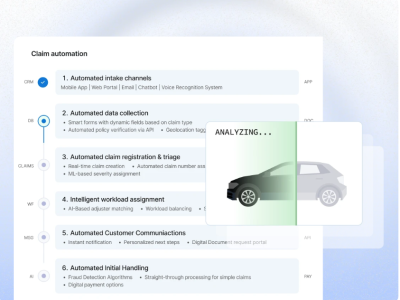The function of human resources (HR) has changed dramatically in today’s quickly evolving business environment. HR software solutions have streamlined many HR processes, making it easier to handle complex tasks.
HR departments now manage a broad range of tasks, including data analysis, compliance, hiring, performance reviews, and assessments made possible by the benefits of Human Resources Management System. Implementing the best HR software in UAE, Dubai ensures efficiency, compliance, and improved workforce management.
Human Resource Management Systems (HRMS) are being used by many firms to effectively manage these complicated activities.
HRMS: What is it?
An all-inclusive software program called a Human Resource Management System (HRMS) is designed to assist businesses in better managing their human resources.
It increases productivity and efficiency by integrating multiple HR tasks into a single, integrated system.
HR professionals can concentrate on strategic efforts that propel business performance by using HRMS systems, which automate repetitive activities and offer insightful data.

Top 10 Benefits of Human Resources Management System (HRMS)
1. Centralized Information Management:
The capacity of HRMS to offer a consolidated hub for all employee data is one of its biggest benefits. This includes:
- Personal data
- Work history
- Performance reviews
- Time-off documentation
Advantages:
- Cuts Down on Paperwork: Reduces the need for physical papers, improving data administration efficiency.
- Enhances Data Accuracy: Reduces inaccuracies in personnel records with one source of truth.
- Improves Data Security: Protects sensitive employee information with improved access control.
2. Simplified Hiring Procedure:
Modern HRMS platforms automate many steps in the hiring process, such as:
- Posting jobs
- Reviewing applications
- Setting up interviews
- Evaluating candidates
Advantages:
- Saves Time: Automation allows HR professionals to focus on strategic activities.
- Enhances Quality of Hiring: Sophisticated screening mechanisms help find top applicants.
- Improves Candidate Experience: A seamless application process creates a positive perception of the company.
3. Workers’ Self-Service:
Self-service portals enable staff members to handle their own data, including:
- Access to pay stubs
- Corporate policies
- Time off requests
- Personal information updates
Advantages:
- Lessens HR Workload: Cuts down on routine inquiries to HR.
- Employee Empowerment: Access to their information fosters accountability.
- Enhances Data Accuracy: Employees are more likely to keep their records updated.
4. Effective Payroll Administration:
HRMS integrates payroll functions with other HR procedures, including:
- Leave management
- Tax compliance
- Time and attendance tracking
Advantages:
- Reduces Payroll Errors: Automates computations to minimize human error.
- Guarantees On-Time Payments: Efficient procedures ensure timely salary distributions.
- Simplifies Tax Compliance: Automatically updates tax laws to ensure compliance.
5. Instantaneous Reporting and Analytics:
Advanced HRMS platforms provide robust workforce analytics, including:
- Compliance reports
- Performance measures
Advantages:
- Encourages Data-Driven Decision Making: Access to real-time data aids informed judgments.
- Identifies Opportunities for Development: Analytics help identify gaps in performance.
- Boosts Strategic Planning: Data insights inform long-term personnel management.
6. Enhanced Administration of Compliance:
HRMS helps businesses adhere to various laws and rules, such as:
- Tax laws
- Labor legislation
- Industry-specific guidelines
Advantages:
- Lowers Legal Risks: Automated checks reduce the possibility of infractions.
- Simplifies Audits: Well-organized HRMS makes audit documentation easier.
- Maintains Up-to-Date Compliance: Regular system updates keep HR teams informed.
7. Improved Management of Performance:
HRMS offers tools for ongoing performance assessment, including:
- Automated performance reviews
- Goal-setting and tracking
- Regular feedback systems
Advantages:
- Encourages Employee Growth: Continuous feedback fosters ongoing development.
- Aligns Aspirations with Organizational Goals: Specific goals ensure employees support the organization’s objectives.
- Enables Timely Interventions: Early detection of underperformance allows for prompt assistance.
8. Engagement and Retention of Employees:
Modern HRMS platforms enhance employee engagement through features like:
- Career development tools
- Pulse surveys
- Recognition programs
Advantages:
- Enhances Employee Satisfaction: Recognition programs boost motivation and morale.
- Decreases Turnover: A positive environment reduces turnover rates.
- Enhances Company Culture: Focusing on engagement fosters a happy work environment.
9. Planning for Succession and Talent Management:
HRMS provides capabilities for:
- Succession planning
- Learning and development initiatives
- Skills gap analysis
Advantages:
- Identifies High-Potential Workers: Systems can highlight advancement-oriented personnel.
- Encourages Career Growth: Educational resources promote career advancement.
- Maintains Leadership: Succession planning mitigates the impact of turnover in key positions.
10. Flexibility and Scalability:
HRMS offers cloud-based solutions that:
- Interface with other corporate systems
- Adapt to the needs of expanding businesses
Advantages:
- Encourages Business Growth: Scalable systems accommodate increasing complexity.
- Adjusts to Shifting HR Requirements: Flexibility allows organizations to meet specific needs.
- Offers Affordable Solutions: Modular options ensure even small organizations can benefit.
HRMS’s Future
As 2025 approaches, HRMS is evolving through:
- Integration of AI and machine learning: Enhances predictive capacities for labor needs.
- Predictive analytics for workforce planning: Supports proactive talent management.
- Improved support for remote work: Develops features for engagement and performance tracking for virtual teams.
Thanks to these developments, HRMS is becoming a vital instrument for contemporary HR management, helping businesses address the challenges of a changing workplace.

Conclusion:
Human Resource Management Systems have become crucial for businesses aiming to streamline their HR processes.
By centralizing data, automating tasks, and providing comprehensive analytics, HR software enhances efficiency, allowing HR workers to focus on strategic efforts rather than administrative tasks. Implementing the best HR software in UAE, Dubai ensures compliance with local labor laws while optimizing workforce management.
Whether you’re a large organization seeking full personnel management or a small firm needing to streamline payroll, HRMS offers tailored solutions.
Investing in a robust HRMS can provide your company a competitive edge in attracting, retaining, and managing outstanding personnel as the business world evolves.
Remember, the right HRMS provider can transform your HR department from a cost center into a strategic partner that drives your company’s growth and success. Explore your HRMS options to see how they can benefit your organization in 2025 and beyond.
Embracing these technologies is not just a choice; it’s essential for long-term success.








